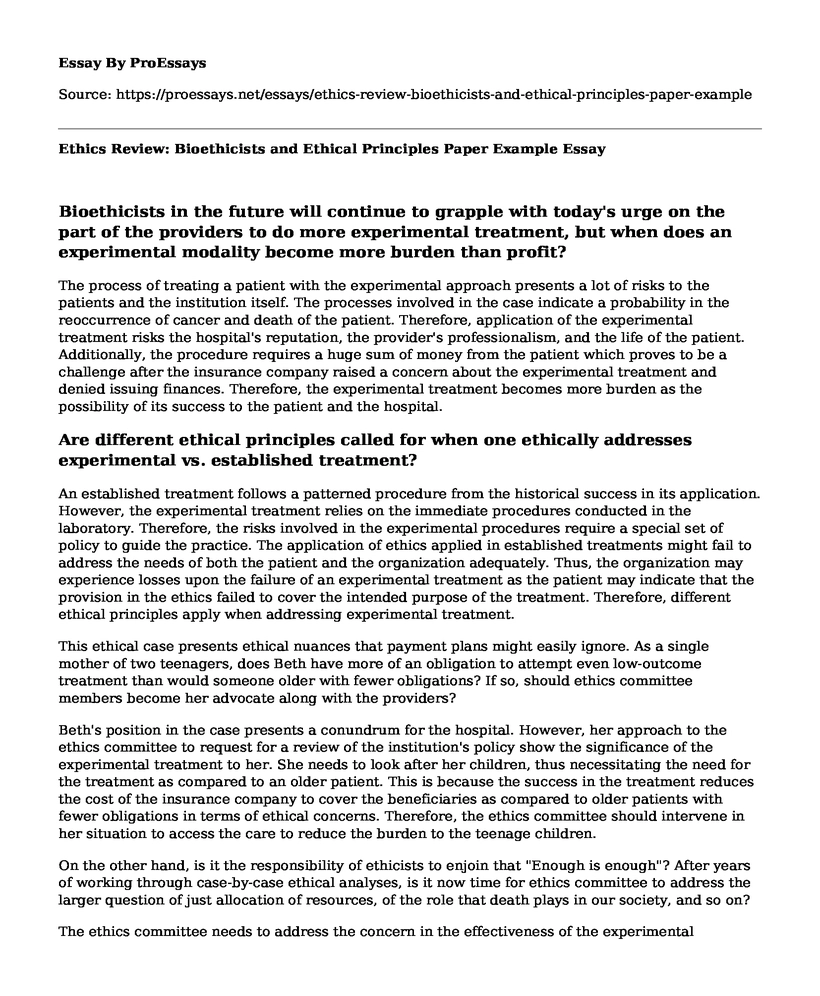Bioethicists in the future will continue to grapple with today's urge on the part of the providers to do more experimental treatment, but when does an experimental modality become more burden than profit?
The process of treating a patient with the experimental approach presents a lot of risks to the patients and the institution itself. The processes involved in the case indicate a probability in the reoccurrence of cancer and death of the patient. Therefore, application of the experimental treatment risks the hospital's reputation, the provider's professionalism, and the life of the patient. Additionally, the procedure requires a huge sum of money from the patient which proves to be a challenge after the insurance company raised a concern about the experimental treatment and denied issuing finances. Therefore, the experimental treatment becomes more burden as the possibility of its success to the patient and the hospital.
Are different ethical principles called for when one ethically addresses experimental vs. established treatment?
An established treatment follows a patterned procedure from the historical success in its application. However, the experimental treatment relies on the immediate procedures conducted in the laboratory. Therefore, the risks involved in the experimental procedures require a special set of policy to guide the practice. The application of ethics applied in established treatments might fail to address the needs of both the patient and the organization adequately. Thus, the organization may experience losses upon the failure of an experimental treatment as the patient may indicate that the provision in the ethics failed to cover the intended purpose of the treatment. Therefore, different ethical principles apply when addressing experimental treatment.
This ethical case presents ethical nuances that payment plans might easily ignore. As a single mother of two teenagers, does Beth have more of an obligation to attempt even low-outcome treatment than would someone older with fewer obligations? If so, should ethics committee members become her advocate along with the providers?
Beth's position in the case presents a conundrum for the hospital. However, her approach to the ethics committee to request for a review of the institution's policy show the significance of the experimental treatment to her. She needs to look after her children, thus necessitating the need for the treatment as compared to an older patient. This is because the success in the treatment reduces the cost of the insurance company to cover the beneficiaries as compared to older patients with fewer obligations in terms of ethical concerns. Therefore, the ethics committee should intervene in her situation to access the care to reduce the burden to the teenage children.
On the other hand, is it the responsibility of ethicists to enjoin that "Enough is enough"? After years of working through case-by-case ethical analyses, is it now time for ethics committee to address the larger question of just allocation of resources, of the role that death plays in our society, and so on?
The ethics committee needs to address the concern in the effectiveness of the experimental treatments by focusing on ethical concerns. The effects of the experimental treatment indicate the expense to the institution and the patient. A 25% mortality rate and 30-50% reoccurrence of cancer as a result of the experimental treatment illustrates the need of the ethics committee to intervene in patient's cases to prevent the loss of lives. Therefore, the ethics committee should ensure the allocation of resources to patients suffering and the effects of the treatment to the patient's dependants.
When ethics committee, as advocates for individual patients, address institutional policy, what value conflicts are likely to emerge?
The extent provided for a patient's primary care results in the conflict of values between the ethics committee and the institution. This conflict emerges as a result of the allocation of resources towards the treatment procedure. Additionally, the cost of the treatment affects the institutional policies as the procedure costs the institution a noticeable sum in providing primary care to the patient. The provided care leads to the possibility of a non-repayable condition based on the patient's financial capabilities.
Cite this page
Ethics Review: Bioethicists and Ethical Principles Paper Example. (2022, Aug 23). Retrieved from https://proessays.net/essays/ethics-review-bioethicists-and-ethical-principles-paper-example
If you are the original author of this essay and no longer wish to have it published on the ProEssays website, please click below to request its removal:
- Essay Sample on Cancer-Fighting Powers of Human Skin Bacteria
- Essay on Dissemination of Evidence-Based Practice
- Essay Sample on Morals of Slavery
- Essay Sample on Evaluating Leadership Competencies for Nursing Professionals
- Essay on Hit-and-Run Victim in Emergency Room: Hospital's Emergency Plan to Stop Bleeding and Revive
- Post-Divorce Parenting: Building Healthy Relationships & Stability - Essay Sample
- Freddie's Story: The Impact of Negative Communication - Essay Sample







